- Home
- George Orwell
Orwell in Spain
Orwell in Spain Read online
Orwell in Spain
The Full Text of Homage to Catalonia with Associated Articles,
Reviews and Letters from The Complete Works of George Orwell
Edited by Peter Davison
Introduction by Christopher Hitchens
PENGUIN BOOKS
Contents
Introduction
Editorial Note
Acknowledgements
Orwell’s Journey to Spain
Extract from ‘As I Please’, 42 [The journey to Spain], Tribune, 15 September 1944
Jennie Lee to Margaret M. Goalby, 23 June 1950: Orwell’s Arrival in Barcelona
Orwell in Spain, December 1936
Extract from letter from Eileen Blair to Leonard Moore, 31 January 1937
‘British Author with the Militia’, The Spanish Revolution: Bulletin of the Workers’ Party of Marxist Unification (POUM)
Letter from Eileen Blair to her mother, 22 March 1937
Letter to Eileen Blair [5? April 1937]
Extract from letter from Eileen Blair to Leonard Moore, 12 April 1937
Letter from Eileen Blair to her brother, Dr Laurence (‘Eric’) O’Shaughnessy, 1 May 1937
Extract from letter to Victor Gollancz, 1 May 1937
Orwell’s Wound
Letter to Cyril Connolly, 8 June 1937
Letter from Eileen Blair to Dr Laurence (‘Eric’) O’Shaughnessy, c. 10 June 1937
Escape from Spain
Reports on Eric and Eileen Blair to Tribunal for Espionage and High Treason, Valencia
Report on Charles Doran
Homage to Catalonia
‘Spilling the Spanish Beans’, New English Weekly, 29 July and 2 September 1937
Letter from Eileen Blair to John McNair, 29 July 1937
Letter from George Kopp to Dr Laurence O’Shaughnessy, 7 July 1937
Letter from George Kopp to Lt.-Col. Burillo, Chief of Police, Barcelona, 7 July 1937 (translation)
Letter from George Kopp to Eileen Blair, 8 July 1937
Review: Franz Borkenau, The Spanish Cockpit; John Sommerfield, Volunteer in Spain, 31 July 1937
Letter to Rayner Heppenstall, 31 July 1937
‘Eye-Witness in Barcelona’, Controversy, August 1937
Abstracts of Reports on the Spanish Civil War in the Daily Worker and News Chronicle, 1936–7
Letter to Amy Charlesworth, 1 August 1937
Letter to Charles Doran, 2 August 1937
Unpublished response to Authors Take Sides on the Spanish War, 3–6 August 1937
Letter to Geoffrey Gorer, 15 September 1937
Review: Mary Low and Juan Brea, Red Spanish Notebook; R. Timmermans, Heroes of the Alcazar; Martin Armstrong, Spanish Circus, 9 October 1937
Letter to H. N. Brailsford, 10 December 1937
Review: Mairin Mitchell, Storm Over Spain ; Arnold Lunn, Spanish Rehearsal ; E. Allison Peers, Catalonia Infelix; José Castillejo, Wars of Ideas in Spain ; José Ortega y Gasset, Invertebrate Spain, 11 December 1937
Letter from H. N. Brailsford to Orwell, 17 December 1937
Letter to H. N. Brailsford, 18 December 1937
Review: G. L. Steer, The Tree of Gernika ; Arthur Koestler, Spanish Testament, 5 February 1938
Letter to the Editor, Time and Tide: ‘“Trotskyist” Publications’, 5 February 1938
Letter to Raymond Mortimer, 9 February 1938
Letter to Stephen Spender, 2 April 1938
Letter to Geoffrey Gorer, 18 April 1938
‘Notes on the Spanish Militias’
To the Editor, The Times Literary Supplement, 14 May 1938
Letter from Sir Richard Rees to Orwell, 25 May 1938
Letter to the Editor, The Listener, 16 June 1938
Review: Robert Sencourt, Spain’s Ordeal ; Anonymous, Franco’s Rule, 23 June 1938
Review: Frank Jellinek, The Civil War in Spain, 8 July 1938
Review: The Duchess of Atholl, Searchlight on Spain, 16 July 1938
Letter to the Editor, Manchester Guardian, 5 August 1938
Letter to Yvonne Davet, 18 August 1938
Letter to Raymond Postgate, 21 October 1938
Summary of article from La Flèche, 14 October 1938
Review: E. Allison Peers, The Church in Spain, 1737–1937; Eoin O’Duffy, Crusade in Spain, 24 November 1938
Letter to Frank Jellinek, 20 December 1938
‘Release of George Kopp’, Independent News, 23 December 1938
‘Caesarean Section in Spain’, The Highway, March 1939
Letter to Yvonne Davet, 19 June 1939
Review: Nancy Johnstone, Hotel in Flight, December 1939
Review: S. Casado, The Last Days of Madrid ; T. C. Worsley, Behind the Battle, 20 January 1940
Review: E. Allison Peers, The Spanish Dilemma ; Charles Duff, A Key to Victory: Spain, 21 December 1940
Extract from War-time Diary, 22 January 1941
Review: Arturo Barea, The Forge, September 1941
Extract from letter to Partisan Review, 23 September 1941
Extract from BBC Weekly News Review for India, 22 [Comparison with the Spanish Civil War], 16 May 1942
‘Looking Back on the Spanish War’ [1942?], New Road, January 1943?
Proposed BBC Broadcast on the Spanish Civil War, 3 December 1942
Review: E. Allison Peers, Spain in Eclipse, 1937–1943; Lawrence Dundas, Behind the Spanish Mask, 28 November 1943
Extract from ‘As I Please’, 10 [How the lie becomes truth], Tribune, 4 February 1944
‘The Eight Years of War: Spanish Memories’, Observer, 16 July 1944
Review: Charles d’Ydewalle, An Interlude in Spain, 24 December 1944
Review: Arturo Barea, The Clash, 24 March 1946
Orwell’s Pamphlet Collection: Spanish Civil War
A summary of letters from and to David Astor, 4 and 5 March 1949
Further Reading
PENGUIN BOOKS
Orwell in Spain
‘One of the most influential English writers of the twentieth century’ Robert McCrum, Observer
‘A prophet who thought the unthinkable and spoke the unspeakable, even when it offended conventional thought’ Peter Grosvenor, Daily Express
‘He saw through everything because he could also see through himself. Many writers and journalists have tried to imitate his particular kind of clarity without possessing anything like his moral authority’ Peter Ackroyd, The Times
‘Orwell’s innocent eye was often devastatingly perceptive… a man who looked at his world with wonder and wrote down exactly what he saw, in admirable prose’ John Mortimer, Evening Standard
‘Matchlessly sharp and fresh… The clearest and most compelling English prose style this century’ John Carey, Sunday Times
‘It is impossible not to be elated by his literary and political writing – and enraged by what he was up against… the most lovable of writers, someone whose books can make the reader long for his company’ Geoffrey Wheatcroft, Spectator
‘His intellectual honesty was a virtue… it wasn’t just the amount of truth he told but the way he told it, in prose transmuted to poetry by the pressure of his dedication’ Clive James, New Yorker
‘The finest English essayist of his century… He made it his business to tell the truth at a time when many contemporaries believed that history had ordained the lie… His work endures, as lucid and vigorous as the day it was written’ Paul Gray, Time
ERIC ARTHUR BLAIR (George Orwell) was born in 1903 in India, where his father worked for the Civil Service. The family moved to England in 1907 and in 1917 Orwell entered Eton, where he contributed regularly to the various college magazines. From 1922 to 1927 he served with the Indian Imperial Police Force in Burma, an experience that inspired his fir
st novel, Burmese Days (1934). Several years of poverty followed. He lived in Paris for two years before returning to England, where he worked successively as a private tutor, schoolteacher and bookshop assistant, and contributed reviews and articles to a number of periodicals. Down and Out in Paris and London was published in 1933. In 1936 he was commissioned by Victor Gollancz to visit areas of mass unemployment in Lancashire and Yorkshire, and The Road to Wigan Pier (1937) is a powerful description of the poverty he saw there. At the end of 1936 Orwell went to Spain to fight for the Republicans and was wounded. Homage to Catalonia is his account of the civil war. He was admitted to a sanatorium in 1938 and from then on was never fully fit. He spent six months in Morocco and there wrote Coming Up for Air. During the Second World War he served in the Home Guard and worked for the BBC Eastern Service from 1941 to 1943. As literary editor of Tribune he contributed a regular page of political and literary commentary, and he also wrote for the Observer and later for the Manchester Evening News. His unique political allegory, Animal Farm, was published in 1945, and it was this novel, together with Nineteen Eighty-Four (1949), which brought him world-wide fame.
George Orwell died in London in January 1950. A few days before, Desmond MacCarthy had sent him a message of greeting in which he wrote: ‘You have made an indelible mark on English literature… you are among the few memorable writers of your generation.’
PETER DAVISON is Research Professor of English at De Montfort University, Leicester. He was born in Newcastle upon Tyne in 1926 and studied for a London External BA (1954) by correspondence course. He edited an Elizabethan text for a London MA (1957) and then taught at Sydney University, where he gained a Ph.D. He was awarded a D.Litt. and an Hon. D. Arts by De Montfort University in 1999. He has written and edited fifteen books as well as the Facsimile Edition of the manuscript of Nineteen Eighty-Four and the twenty volumes of Orwell’s Complete Works (with Ian Angus and Sheila Davison). He is a Past-President of the Bibliographical Society, whose journal he edited for twelve years. He was made an OBE in 1999 for services to literature.
CHRISTOPHER HITCHENS is a regular columnist for Vanity Fair and the Nation. His books include Blood, Class and Nostalgia: Anglo-American Ironies (1990) and No One Left to Lie To: The Triangulations of William Jefferson Clinton (1998). He is currently Professor of Liberal Studies at the New School for Social Research in New York, and lives in Washington, DC.
Introduction
The grandeur of George Orwell, in our store of moral and intellectual memory, is to be found partly in his very lack of grandeur. He is remembered, with different and varying degrees of distinctness, as the man who confronted three of the great crises of the twentieth century and got all three of them, so to speak, ‘right’. He was right, earlier than most, about imperialism, viewing it as an unjust and unjustifiable form of rule, and also as a cause of war. He was right, early and often, about the menace presented by Fascism and National Socialism, not just to the peace of the world but to the very idea of civilization. And he was right about Stalinism, about the great and the small temptations that it offered to certain kinds of intellectual, and about the monstrous consequences that would ensue from that nightmarish sleep of reason.
He brought off this triple achievement, furthermore, in his lowly capacity as an impoverished freelance journalist and amateur novelist. He had no resources beyond his own, he enjoyed the backing of no party or organization or big newspaper, let alone any department of state. Much of his energy was dissipated in the simple struggle to get published, or in the banal effort to meet a quotidian schedule of bills and deadlines. He had no university education, no credential nor area of expertise. He had no capital. Yet his unexciting pen-name, drawn from a rather placid English river, is known to millions as a synonym for prescience and integrity, and the adjective ‘Orwellian’ is understood widely and – this has its significance – ambivalently. To describe a situation as ‘Orwellian’ is to announce dystopia: the triumph of force and sadism and demagogy over humanism. To call a person ‘Orwellian’ is to summon the latent ability of an individual to resist such triumphs, or at least to see through them and call them by their right names.
Though he is best remembered for his satires upon, and polemics against, the big lie and grand illusion – he properly understood that it was both – of the ‘Great Soviet Experiment’, Orwell acquired the necessary knowledge and insight for that task as a front-line fighter against the European Right and its ‘crusade’ (the term actually employed by Franco and his Vatican supporters) to immolate the Spanish Republic. It was while serving in Catalonia that he survived a fascist bullet through his throat while in the trenches, but very nearly did not survive a Communist stab in the back while recuperating in Barcelona. From this near-accidental opportunity to bear witness came the body of work we now understand as ‘Orwellian’. This work had been slowly begun in the sullen villages of colonial Burma, and refined in slums and coal-mines and doss-houses and on the picket-lines of the Depression, but the crucible – or the point where the hammer met the anvil – was in Spain.
Introducing the American edition of Homage to Catalonia in 1952 (the first such edition, incidentally, since the book did not find a publisher in the United States until fourteen years after it was written and two years after its author had died a virtual pauper), Lionel Trilling made the uncondescending observation that Orwell was not a genius. By this he meant, and stated very finely:
If we ask what it is that he stands for, what he is the figure of, the answer is: the virtue of not being a genius, of fronting the world with nothing more than one’s simple, direct, undeceived intelligence, and a respect for the powers one does have, and the work one undertakes to do… He is not a genius – what a relief! What an encouragement. For he communicates to us the sense that what he has done, any one of us could do.
This judgement strikes me as being simultaneously true and beautiful. Orwell was physically brave in Spain, but not heroically so. He did no more than countless other volunteer soldiers, and suffered very much less than many of them. But when he was put to the test, and stumbled across an important chunk of evidence, he had to confront the strong pressure either to lie or to keep silent. Here again, he was exceptional rather than exemplary. He simply resolved that he would tell the truth as he saw it, and would stipulate that he had only the vantage point of a bewildered and occasionally frightened but none the less determined individual. He repeatedly enjoins the reader, in effect, not to take him upon trust:
It will never be possible to get a completely accurate and unbiased account of the Barcelona fighting, because the necessary records do not exist. Future historians will have nothing to go upon except a mass of accusations and party propaganda. I myself have little data beyond what I saw with my own eyes and what I have learned from other eye-witnesses whom I believe to be reliable.
In this properly provisional verdict, however, he unknowingly erred on the side of pessimism. The history of the May events in Barcelona in 1937 was certainly buried for years under a slag-heap of slander and falsification. Orwell, indeed, derived his terrifying notion of the memory-hole and the rewritten past, in Nineteen Eighty-Four, from exactly this single instance of the abolished memory. ‘This kind of thing is frightening to me,’ he wrote about Catalonia, ‘because it often gives me the feeling that the very concept of objective truth is fading out of the world’:
After all, the chances are that those lies, or at any rate similar lies, will pass into history… The implied objective of this line of thought is a nightmare world in which the Leader, or some ruling clique, controls not only the future but the past. If the Leader says of such and such an event, ‘It never happened’ – well, it never happened. If he says that two and two are five – well, two and two are five.
But in our very immediate past, documents have surfaced to show that his vulgar, empirical, personal, commonsensical deposition was verifiable after all. The recent opening of Communist records in Moscow, and also of closely held
Franco-era documentation in Madrid and Salamanca, has provided a posthumous vindication.
The narrative core of Homage to Catalonia, it might be argued, is a series of events that occurred in and around the Barcelona telephone exchange in early May 1937. Orwell was a witness to these events, by the relative accident of his having signed up with the militia of the anti-Stalinist POUM (Partido Obrero de Unificación Marxista) upon arriving in Spain. Allowing as he did for the bias that this lent to his first-hand observations, he none the less became convinced that he had been the spectator of a full-blown Stalinist putsch, complete with rigged evidence, false allegations and an ulterior hand directed by Moscow. The outright and evidently concerted fabrications that immediately followed in the press, which convinced or neutralized so many ‘progressive intellectuals’, only persuaded him the more that he had watched a lie being gestated and then born.
Well, now we have the papers of the Soviet Military Archive in Moscow, formally known as the State Military Archive. ‘Document Forty-Two’, in the series dealing with Spain, provides us with the text of a lengthy unsigned report, delivered on 15 April 1937, and forwarded by Georgi Dimitrov to Marshal Voroshilov. The importance of the traffic is emphasized by this very routing: unimportant messages did not go from the head of the Comintern to the chief of the Red Army and thus almost certainly to Stalin himself. (The actual author may well have been André Marty, the French-born Comintern agent for Spain, memorably etched in at least some of his cold hatefulness by Ernest Hemingway in For Whom the Bell Tolls.)
In robotic prose, the author characterizes the non-Communist left in the Spanish Republic and specifically Catalonia as ‘fascists or semi-fascists’. He goes on to describe the position of Moscow as ‘absolutely correct on every question’. This slavish stuff might be called routine, but just after a paean to the ‘natural and indisputable’ inevitability of a Communist Party victory, the writer of the report comes to the point. A crisis may be objectively brewing, given the staunchly anti-Russian positions taken by Largo Caballero and his Republican cabinet, but it may still need some subjective assistance. In fact, the duty of the Party involves ‘not waiting passively for a “natural” unleashing of the hidden government crisis, but to hasten it and, if necessary, to provoke it’. The date of this proposal, which also announces that ‘the Party is waiting for your advice on this question’, anticipates the Communist police attack on the Barcelona telephone exchange by a matter of just over two weeks.

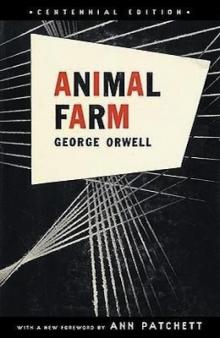 Animal Farm & 1984
Animal Farm & 1984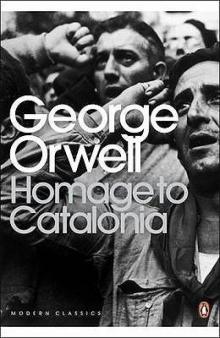 Homage to Catalonia
Homage to Catalonia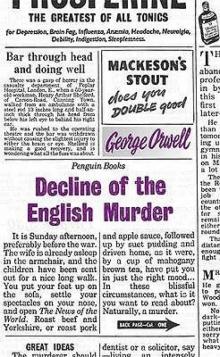 Decline of the English Murder
Decline of the English Murder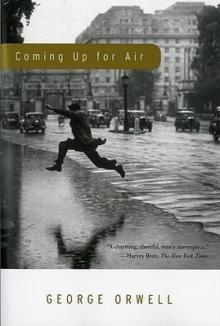 Coming Up for Air
Coming Up for Air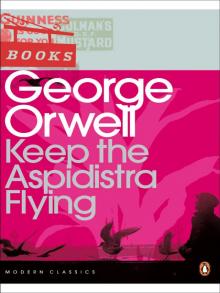 Keep the Aspidistra Flying
Keep the Aspidistra Flying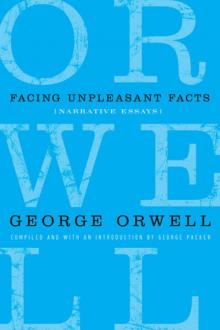 Facing Unpleasant Facts: Narrative Essays
Facing Unpleasant Facts: Narrative Essays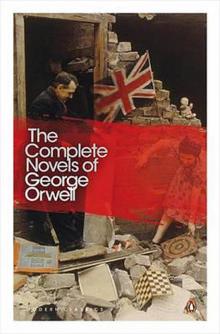 The Complete Novels of George Orwell
The Complete Novels of George Orwell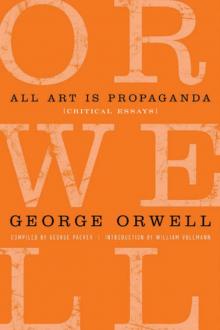 All Art Is Propaganda: Critical Essays
All Art Is Propaganda: Critical Essays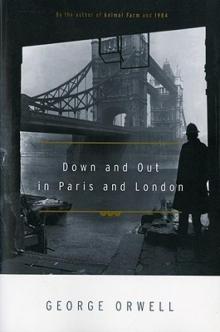 Down and Out in Paris and London
Down and Out in Paris and London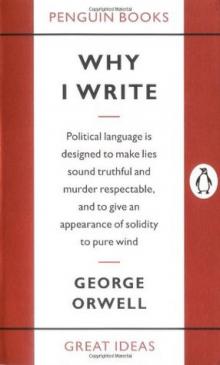 Why I Write
Why I Write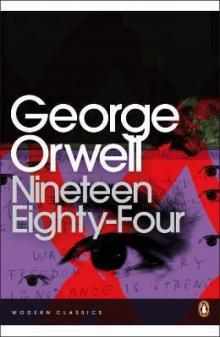 Nineteen Eighty-Four
Nineteen Eighty-Four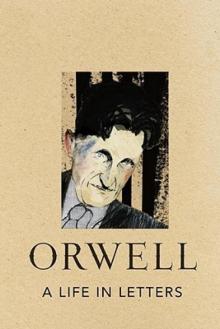 A Life in Letters
A Life in Letters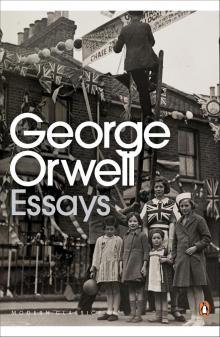 Essays
Essays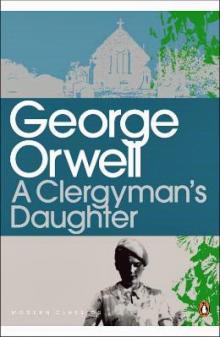 A Clergyman's Daughter
A Clergyman's Daughter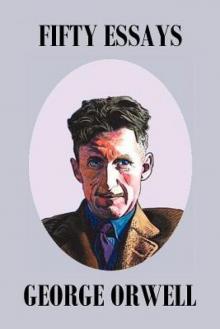 Fifty Orwell Essays
Fifty Orwell Essays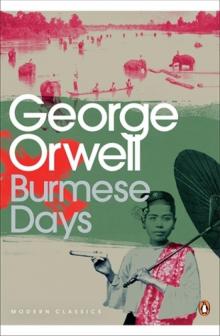 Burmese Days
Burmese Days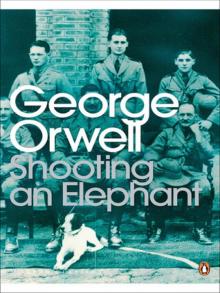 Shooting an Elephant
Shooting an Elephant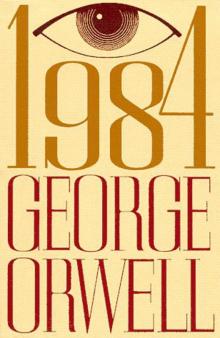 1984 (Penguin)
1984 (Penguin)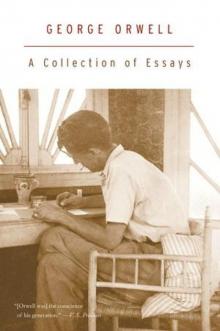 A Collection of Essays
A Collection of Essays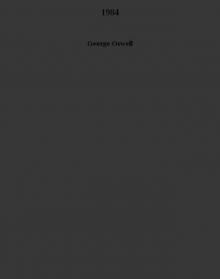 1984
1984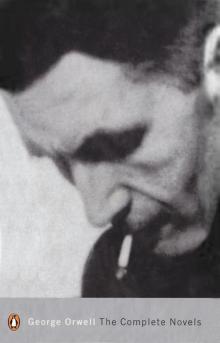 The Complete Novels
The Complete Novels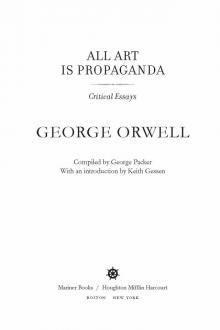 All Art Is Propaganda
All Art Is Propaganda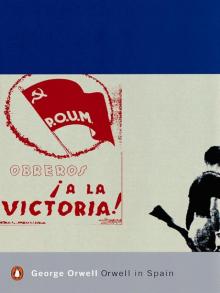 Orwell in Spain
Orwell in Spain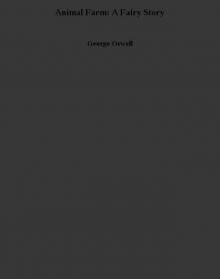 Animal Farm: A Fairy Story
Animal Farm: A Fairy Story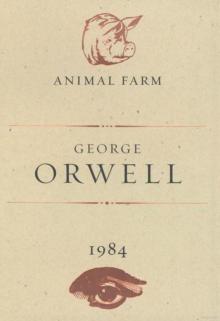 Animal Farm and 1984
Animal Farm and 1984